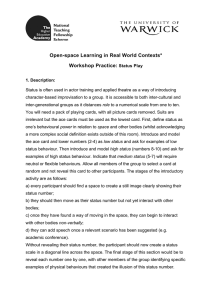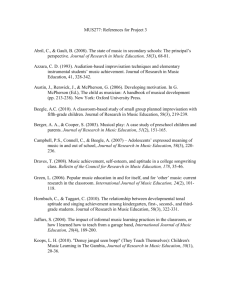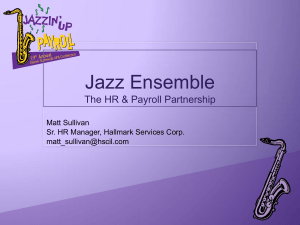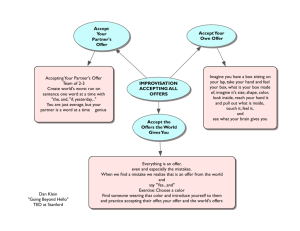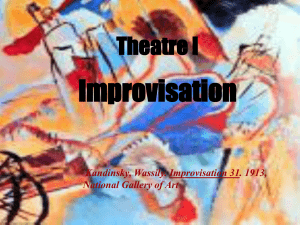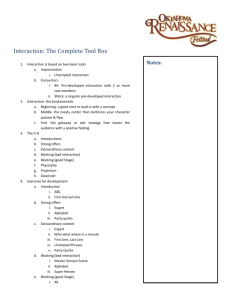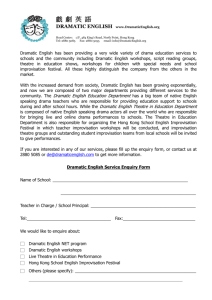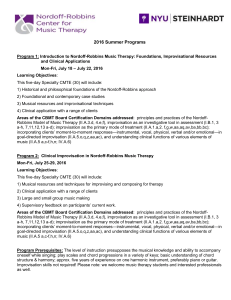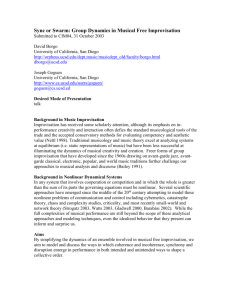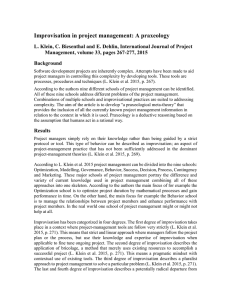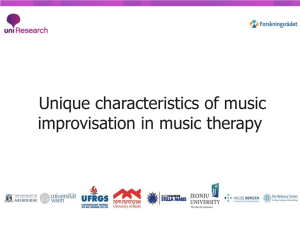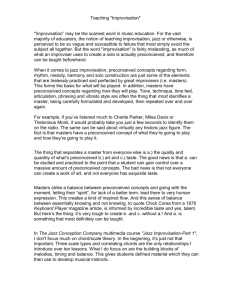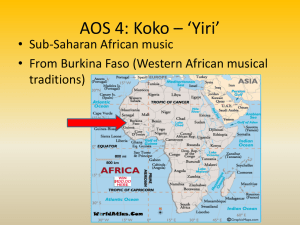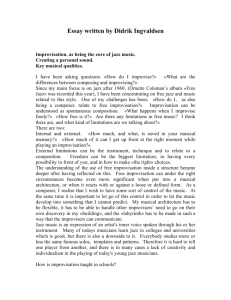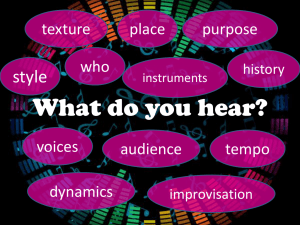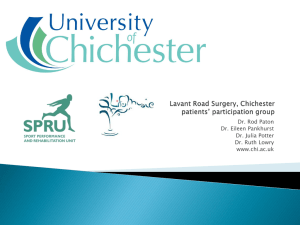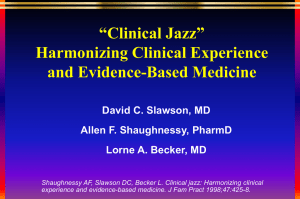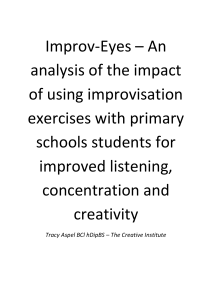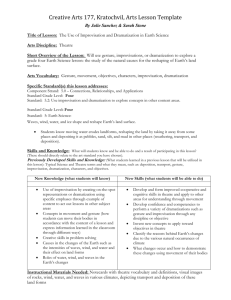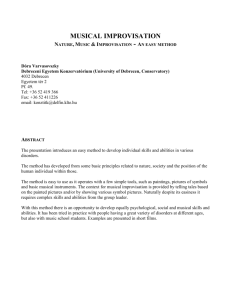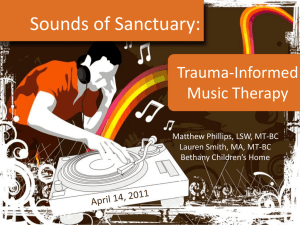MUS 3113 Community Music Sessions
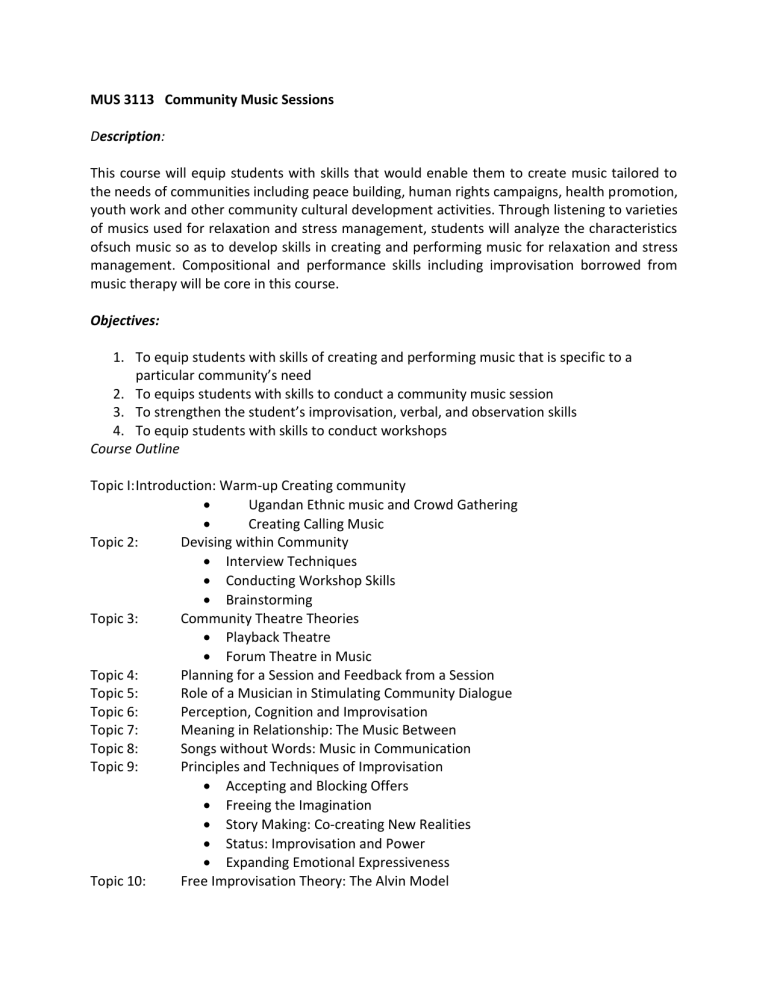
MUS 3113 Community Music Sessions
Description:
This course will equip students with skills that would enable them to create music tailored to the needs of communities including peace building, human rights campaigns, health promotion, youth work and other community cultural development activities. Through listening to varieties of musics used for relaxation and stress management, students will analyze the characteristics ofsuch music so as to develop skills in creating and performing music for relaxation and stress management. Compositional and performance skills including improvisation borrowed from music therapy will be core in this course.
Objectives:
1.
To equip students with skills of creating and performing music that is specific to a particular community’s need
2.
To equips students with skills to conduct a community music session
3.
To strengthen the student’s improvisation, verbal, and observation skills
4.
To equip students with skills to conduct workshops
Course Outline
Topic I: Introduction: Warm-up Creating community
Ugandan Ethnic music and Crowd Gathering
Creating Calling Music
Topic 2: Devising within Community
Interview Techniques
Conducting Workshop Skills
Brainstorming
Topic 3:
Topic 4:
Community Theatre Theories
Playback Theatre
Forum Theatre in Music
Planning for a Session and Feedback from a Session
Topic 5:
Topic 6:
Topic 7:
Topic 8:
Topic 9:
Topic 10:
Role of a Musician in Stimulating Community Dialogue
Perception, Cognition and Improvisation
Meaning in Relationship: The Music Between
Songs without Words: Music in Communication
Principles and Techniques of Improvisation
Accepting and Blocking Offers
Freeing the Imagination
Story Making: Co-creating New Realities
Status: Improvisation and Power
Expanding Emotional Expressiveness
Free Improvisation Theory: The Alvin Model
Topic 11:
Topic 12:
Topic 13:
Topic Group Improvisation Leadership
Use of Percussion Instruments
Meaningful Contact With the Other Players
Flexible Playing in a Responsive and Adaptable Manner
Preparatory Skills for Music Improvisation
Terms and Nomenclature Germane
Manipulation of Tools
Settings Used for Improvisation: Musical Instruments and Musical
Elements
Determination of Suitable Structures for improvisation
Facilitative Skills
Nonmusical and Musical Techniques to Engage Clients
Listening, Comprehending, and Describing What Is Heard
Verbal Processing Skills
Sorting out and Discussing Improvisation
Recognition and Call Attention to Significant Aspects of the
Experience With Clients
Communication with Co-facilitators
Topic 14: Music and Community Building: Xylophone and Drums Music as a Case Studies
Topic 15: Building Community: Independence and Interdependence of Music and Dance in
Cultures of Africa
Learning Outcomes
1.
Ability to create and perform music that is specific to a thematic community’s need.
2.
Equipped with skills to conduct a community music session
3.
Enhanced improvisation and observation skills
4.
Ability to conduct workshops
5.
Enhanced listening and observation skills
Methods of Teaching/Delivery
Lectures, demonstrations, hands-on, lab, tutorials, Individual readings, field trips
Modes of Assessment
Course Work:
Attendance and participation in class discussion: 5%
Field report: 10%
Mid-Semester test: 15%
Workshops: 10%
Final Examination
Written: 60%
Selected Readings
Beaulieu, John. 1995. Music and Sound in the Healing Arts. New York: Station Hill Press.
Berardi, Gigi. 2005. Finding Balance: Fitness, Training, and Health for a Lifetime in Dance. New
York: Routledge.
Books, Lorenz. 1995. The Healing Energies of Music.Second Edition. Wheaton, Ill: Theosophical
Publishing House.
Campbell, Don. 2000. The Mozart Effect for Children: Awakening Your Child's Mind, Health, and
Creativity with Music. New York: William Morrow.
Klickstein, Gerald. 2009. The Musician's Way: A Guide to Practice, Performance, and Wellness.
Oxford: Oxford Press.
